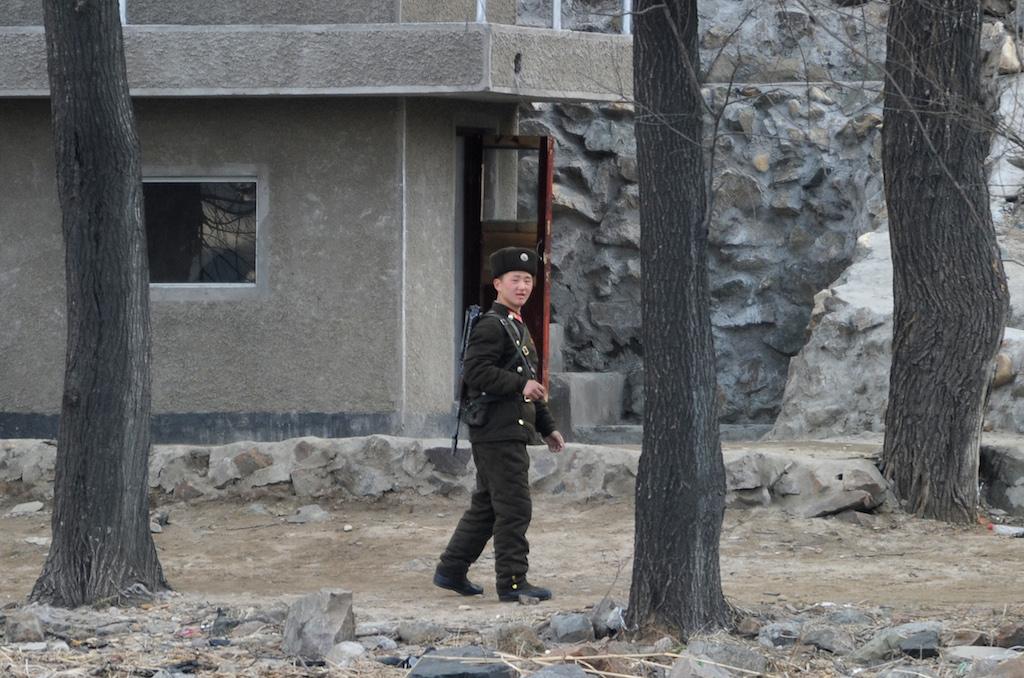Just how bad is tuberculosis in North Korea?
A North Korean soldier patrols along the Yalu River at the North Korean town of Sinuiju on April 11, 2013. To enter the country as a Westerner, you typically need to bring something of value to the regime, like tourist cash or propaganda value. Tuberculosis experts are also welcome.
SEOUL, South Korea — Visiting North Korea is by no means easy.
To get in, you typically need to bring an asset that the country’s ruling elite desperately needs — such as hard cash to spend on a canned tourist trip, or a willingness to let the regime wrest propaganda benefits from your reputation as an eccentric American basketball player.
So it’s significant that since 2008, a team from Stanford University has been allowed to visit several times each year to help address the country’s soaring tuberculosis problem.
They have even been allowed to set up a laboratory to test patients.
The most recent visit by doctors from the Stanford Medical School was late last year. The team hopes to train North Korean doctors to control the potentially fatal disease and bring their laboratory up to internationally recognized standards.
“In North Korea, demand far exceeds capacity. But also on a global level, only a minority of people with TB get modern treatment,” said Stanford professor Gary Schoolnik, part of the team involved in the project.
According to the WHO, there are 345 TB infections per 100,000 people in North Korea, one of the highest rates outside of sub-Saharan Africa. The disease is associated with poverty and unsanitary conditions and is uncommon in the industrialized world. North Korea saw its infection rates increase after floods and famines ravaged the country in the mid-1990s.
Dealing with a health care crisis is always challenging, and in North Korea there are some extra complications. The team from Stanford must be accompanied everywhere they go by minders, and can’t usually speak directly with North Koreans.
But Stanford team members acknowledge that while North Korea is unique in many ways, TB is a global problem and the struggles in North Korea are consistent with the challenges encountered in treating the disease all over the world.
“We see North Korea as a distinctive environment because of its particular political and diplomatic situation, but in fact TB in North Korea is not dissimilar from TB in other resource poor environments,” said professor Schoolnik.
To be cured, TB patients require a course of four different antibiotics for a minimum of six months. The Global Fund to Fights AIDS, Tuberculosis and Malaria, a major international donor, says resource scarcity is North Korea’s biggest problem in addressing its TB crisis.
“Lack of resources is the biggest challenge in providing diagnostic and treatment services to everyone who needs treatment,” Marcela Rojo of the Global Fund wrote in an email. The fund has provided just over $50 million in financing to Pyongyang. "The current grant does not have sufficient funding to cover all the needs,” Rojo added.
Article 56 of North Korea’s constitution stipulates free medical care for all citizens, but access is not believed to be uniform and many illnesses go untreated if the patient is unable to provide money or gifts to doctors, according to a report released in May by Citizens’ Alliance for North Korean Human Rights, a Seoul-based NGO.
The report states, “The medical system in North Korea resembles privatized medical systems in capitalist countries, but people’s earning power is very limited in comparison to the requirements of financial payments in various sectors of the society.”
Accepting aid from an American university risks contradicting the image that the reclusive regime projects of the US. Americans appear as big-nosed villains in much of North Korea’s domestic propaganda.
“The regime understands that the epidemic is a threat to stability,” said Leonid Petrov, Korean Studies Researcher at the Australian National University.
“The North Koreans can explain the presence of Americans in the country by saying that while American imperialism is evil, American people are still kind and they’re coming to North Korea to apologize in the form of aid for their country having inflicted so much harm on the Korean people.”
Professor Schoolnik says that even for Americans it’s possible to have a productive partnership with North Korea after building a foundation of trust.
Pyongyang needs to feel confident that the visiting Americans will maintain an apolitical approach and stick to the tasks that they were granted access to deal with. “We are viewed as individuals that share a commitment to deal with this disease, rather than as representatives of the US government.”
Schoolnik said, “Whatever our citizenship, we’re viewed as providing something important.”
We want to hear your feedback so we can keep improving our website, theworld.org. Please fill out this quick survey and let us know your thoughts (your answers will be anonymous). Thanks for your time!
